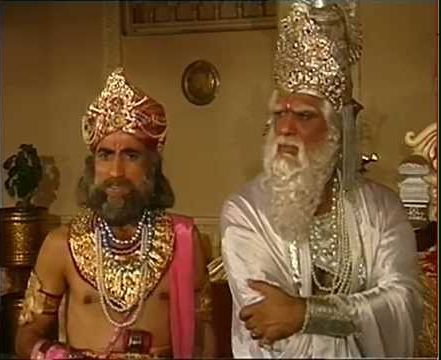Chance and serendipity can often spring profound thoughts and insights; I experienced one such moment today. I was driving towards office and switched on the Radio. All India Radio FM Gold channel was broadcasting an audio re-run of the famed Mahabharat TV Serial.
Prologue: The episode was the last part (Anudyuta Parva) of Sabha Parva - after Pandavas lose their wealth, kingdom and respect in a gambling game and leave for their penance of 12 years Vanvaas & 1 year Agyaatvaas. In the scene after their exit, Vidur (the Prime Minister) visits the quarters of Patriarch Pitaamah Bhishm. Bhishm is cross with himself for not stopping the unethical gambling game which ultimately led to a public disrobing of his great grand daughter-in-law Draupadi.
During the episode, Bhishma utters a very insightful line -
This line rang a bell taking me back little more than two years when the Manmohan Singh government was facing widespread charges of graft and corruption, and Manmohan Singh claimed helplessness at the corruption charges making a point that he himself was clean and was being unfairly blamed for misdeeds his associates.
And then it suddenly dawned on me that the simile between Bhishm's and Manmohan Singh's predicament was not isolated but just the tip of a much larger metaphor for the political scene we've witnessed. Following are the other similes:
कभी कभी मनुष्य अपनी विवशता को अपना कर्तव्य मान लेता है|
[Meaning: Sometimes one assume one's helplessness to be his obligation.]
This line rang a bell taking me back little more than two years when the Manmohan Singh government was facing widespread charges of graft and corruption, and Manmohan Singh claimed helplessness at the corruption charges making a point that he himself was clean and was being unfairly blamed for misdeeds his associates.
And then it suddenly dawned on me that the simile between Bhishm's and Manmohan Singh's predicament was not isolated but just the tip of a much larger metaphor for the political scene we've witnessed. Following are the other similes:
- Manmohan Singh: Bhishm- the decrepit head of the ruling alliance, who has little power to execute his own decisions or even stop wrong decisions taken by the erring courtiers; but who nevertheless refuses to leave the side of the throne.
- Sonia Gandhi: Dhritrashtra - the (actual) head of state who above the nation's welfare wants his/her progeny's welfare. Love and affection towards their progeny make them take decisions which their own discretion^ tells them not to take.
- Pawan Bansal / A Raja / Kanimozhi / Kalmadi etc : Shakuni - the malevolent 'relatives' of the Crown prince who used the Crown prince's ambition for the kingdom combined with his lack of objectivity to their own personal advantage.
- Jairam Ramesh / AK Antony: Kripacharya & Dronacharya - members of court who have no choice but to fight from the side of the throne, irrespective and in spite of their intellect.
- Pranab Mukherjee / P. Chidambaram: Vidur - the intelligent minister(s) of the state who acknowledging their inability to stop the wrongdoing, just steer clear of controversy and keep their own side clean.
- Rahul Gandhi: Duryodhana - The Crown prince who feels that his birth (and not his ability) entitles him to the throne; who is ready to go to any length to get the throne and yet lacks any ability to even execute a sinister plan which he devices.
- India: Draupadi - the daughter in law who's ripped off in front of the whole world for a feud which she was neither an instigator of nor was directly a party to.
Thankfully for India, the sovereign is no longer a monarch who hazards the fortune of the people for a family feud, but the people themselves who decided well in time that we don't need another Kurukshetra and changed power much before a whole war would ensue!
.
^ Discretion is a literal translation - the apt word which came to my mind was विवेक in Hindi
^ Discretion is a literal translation - the apt word which came to my mind was विवेक in Hindi

Comments
Post a Comment